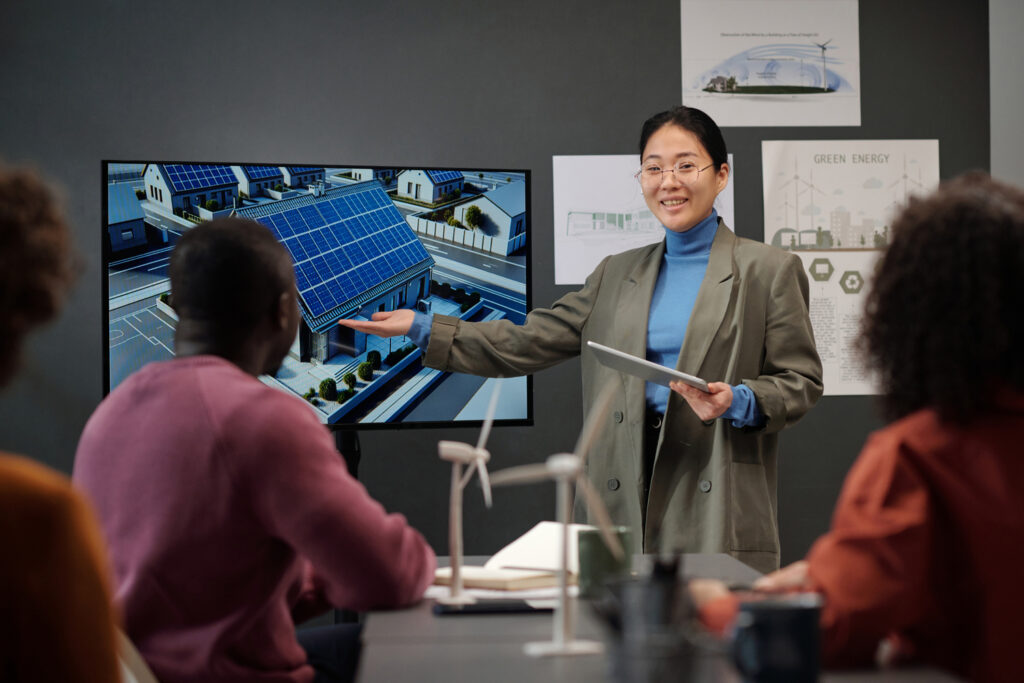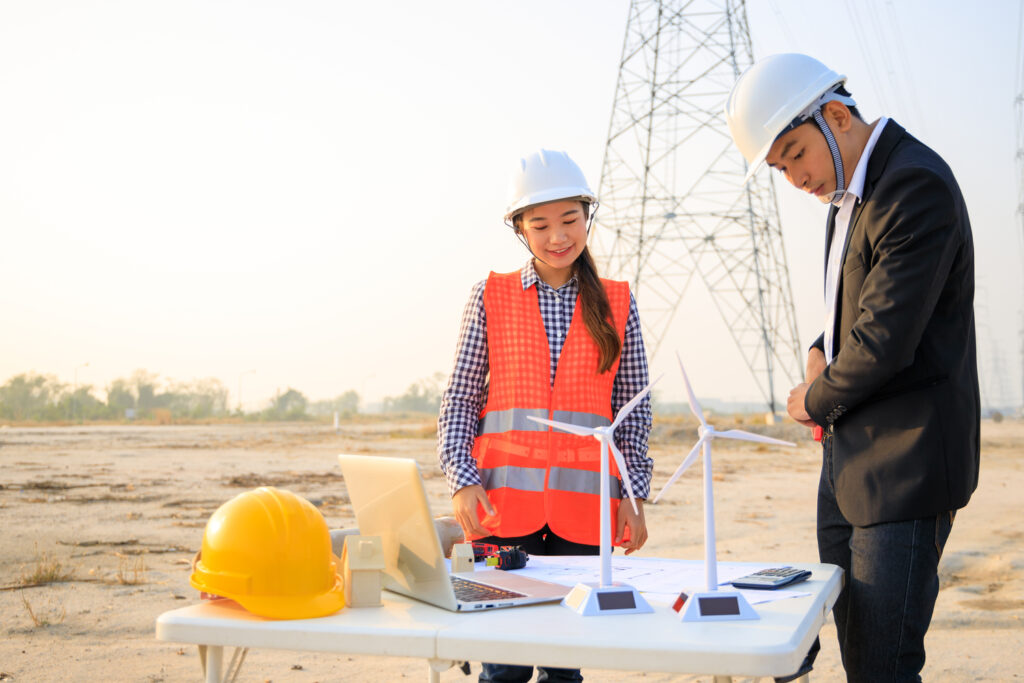Sustainable Energy Engineering
Sustainable Energy Systems Engineering
Engineering for sustainable energy systems has become one of the fundamental pillars of the energy transition. Technologies such as solar thermal energy, thermal energy storage (TES), and green hydrogen production through electrolysis require advanced, integrated, and customized technical solutions. In this context, the role of engineering is not only to design efficient infrastructures but also to ensure their economic viability, environmental sustainability, and operational robustness.
Sustainable Engineering as a Key to the Energy Transition
Role of Engineering in the Development of Advanced Energy Technologies
The transition to a low-carbon energy model cannot be achieved without a solid foundation of specialized engineering. The design of concentrated solar power (CSP) plants, the implementation of large-scale TES systems, or the installation of electrolyzers for green hydrogen are complex processes that require a holistic approach. Engineering serves as the link between technological innovation, industrial application, and societal needs, transforming concepts into functional and scalable solutions.
Energy engineers work on the development of conversion, storage, and distribution technologies, optimizing system efficiency and reducing environmental impact. This ranges from the use of advanced materials to the implementation of intelligent control and automation systems.
Integration of Multiple Disciplines in Complex Energy Projects
Sustainable energy projects involve collaboration across various disciplines: thermodynamics, process engineering, chemistry, electrical, civil, automatic control, power electronics, and more. Modern energy engineering requires a systemic vision, where each component—from a solar collector to a heat exchanger or a thermal battery bank—must be optimized within a broader system.
Moreover, coordination among disciplines is key to meeting environmental regulations, industrial safety standards, and technical and financial performance goals. This interdisciplinarity not only improves the final outcome but also accelerates the implementation of renewable energy solutions.

Engineering Phases in Solar Thermal Systems, TES, and Green Hydrogen
Feasibility Study and Energy Analysis
Every sustainable energy project begins with a critical phase: the technical, economic, and environmental feasibility study. In this stage, variables such as solar irradiation, thermal or electrical demand, available resources, applicable regulations, and investment and operating costs are evaluated.
In addition, a complete energy analysis is carried out, considering system efficiency, capacity factor, thermal or electrical losses, and potential integration with other technologies (e.g., combining CSP with thermal storage or green hydrogen production). This phase determines whether a project is viable and under what conditions.
Conceptual Design and Technology Selection
Based on the initial study, the conceptual design phase begins. Here, the most suitable technologies are chosen depending on the system’s purpose: Is it a power generation system with TES? Is the goal to produce hydrogen for industrial self-consumption? Will it be integrated with a district heating or cooling network?
Operating schemes and key equipment (solar collectors, molten salt tanks, heat exchangers, electrolyzers, compressors) are defined, and a preliminary system architecture is established. Scalability and modularity are also considered—crucial factors in industrial or urban projects.
Detailed Engineering and System Integration
Once the conceptual design is approved, the detailed engineering phase begins. Each system component is precisely specified, including thermal, electrical, and structural calculations, process diagrams, material selection, pipe sizing, foundation design, and more.
The interaction between subsystems (solar field, energy storage, power generation, or hydrogen production) is also defined. This phase is essential to ensure technical compatibility, safety, and operational efficiency. All necessary documentation for construction and equipment procurement is prepared.
Commissioning, Validation, and Operational Optimization
With installation completed, the commissioning phase begins, verifying that the system performs as designed. Functional tests, calibrations, and adjustments are made, both in hardware and control/supervision systems.
Then, operational validation is carried out by analyzing the system’s real-world performance, detecting deviations, and fine-tuning operational parameters. Finally, performance optimization begins, using data analysis, predictive maintenance, and artificial intelligence to continuously improve efficiency and reduce operating costs.

Qualities and Requirements of a Specialized Technical Team in Energy Engineering
Sustainable energy systems such as solar thermal technology, thermal energy storage (TES), and green hydrogen production require a high level of technical specialization. Basic engineering knowledge is not sufficient; a multidisciplinary team with concrete expertise in various energy domains is essential, along with strong competencies in project management and regulatory compliance.
Multidisciplinary Knowledge in Thermal Energy, Fluid Dynamics, and Electrolysis
A competent technical team must master a range of fields that intersect in complex energy projects:
Thermal energy: Advanced understanding of heat transfer, thermodynamic cycles, thermal efficiency, and material behavior at high temperatures—crucial for TES and solar thermal systems.
Fluid dynamics: Ability to design efficient and safe fluid transport systems (thermal fluids, steam, compressed gases), applicable to both solar plants and electrolysis or storage systems.
Water electrolysis: In-depth knowledge of the chemistry and physics of electrolyzers, appropriate selection of technologies (PEM, alkaline, SOEC), electrical and thermal sizing, and management of the produced hydrogen.
This technical knowledge must be combined with the ability to integrate technologies and adapt them to the specific context of each project.
Capability to Manage Complex Projects and Enable Cross-Disciplinary Collaboration
Beyond technical specialization, teams must include professionals with experience in managing industrial projects. This includes:
Planning and controlling timelines, budgets, and quality standards
Coordination across disciplines: civil, electrical, mechanical, and automation engineering
Effective communication with clients, suppliers, authorities, and other stakeholders
Cross-functional collaboration is key for the smooth development of projects that involve multiple technologies and stages. An agile approach is required, supported by cooperative work structures and experience with methodologies such as BIM, Lean Construction, or Project Lifecycle Management.
Experience with Regulations, Safety, and Industrial Sustainability
The regulatory landscape in the energy sector is increasingly stringent. A competent technical team must be well-versed in:
National and international regulations applicable to generation, storage, gas handling, and industrial safety installations.
Safety protocols in environments with pressure, high temperatures, or flammable gases such as hydrogen.
Sustainability criteria and environmental impact assessments, particularly relevant in green energy projects.
Additionally, component certification, validation by regulatory bodies, and compliance with standards such as ISO, IEC, or ASME codes are essential in the development of any modern energy infrastructure project.
Strategic Importance of Energy Engineering in the Current Context

Energy engineering lies at the heart of global solutions for a just, secure, and sustainable energy transition. Its importance is not only technical, but also economic, geopolitical, and environmental.
Sustainable Engineering: A Response to the Climate Crisis and Decarbonization
In the face of global warming and the urgent need to reduce greenhouse gas emissions, energy systems based on renewable sources require strong engineering support:
Development of clean generation plants with energy storage to replace fossil fuels.
Green hydrogen production to decarbonize hard-to-abate sectors such as heavy transport and industry.
Implementation of thermal heating and cooling networks with energy storage to reduce dependency on natural gas.
Engineering is the tool that transforms climate commitments into concrete and operational infrastructure.
Support for Energy Independence and Technological Innovation
The current geopolitical landscape has shown that energy autonomy is essential for economic and social stability. Renewable energy system engineering enables:
Maximizing the use of local energy resources such as solar, wind, or biomass.
Integrating advanced energy storage technologies that reduce reliance on fossil fuel imports.
Driving technological innovation by creating solutions adapted to local contexts and scalable on a global level.
This approach strengthens countries’ resilience to energy crises, international conflicts, and price fluctuations.
Central Role in the Deployment of Critical Energy Infrastructure
Smart power grids, CSP plants with TES, hydrogen production and distribution systems, and hybrid renewable infrastructures are examples of future critical infrastructure. Energy engineering:
Ensures their technical and economic feasibility.
Enables their interoperability with existing networks.
Secures their resilience against failures or extreme conditions.
Moreover, these projects require engineering that not only builds but also supports the operation, maintenance, and evolution of systems throughout their entire life cycle.
Specialized Engineering in Thermal Energy and Green Hydrogen

RPow has established itself as a leading company in the design, development, and implementation of sustainable energy systems, especially in the fields of concentrated solar power (CSP), thermal energy storage (TES), and green hydrogen production. Its approach focuses on combining technical rigor, innovation, and environmental commitment to deliver high-value energy solutions.
Engineering Projects in Concentrated Solar Power and TES
RPow has supported and collaborated on numerous projects where thermal energy is the core of the energy solution. Key achievements include:
Design, commissioning, operation, and maintenance of concentrated solar power systems for industrial applications, using both parabolic trough collectors and solar tower technology. An example project is Ashalim Lot B.
Implementation of sensible heat thermal batteries that store solar or electrical energy as heat to be used in industrial processes or as a heat source for power generation during nighttime. An example project is TES for a cogeneration plant.
These projects demonstrate RPow’s ability to work in both urban and industrial environments, adapting solutions to meet specific client needs.
Specialized Engineering in Hydrogen and Electrolyzers
In the green hydrogen field, RPow has developed a specialized engineering line focused on electrolyzers, centered on the selection, sizing, and integration of equipment into renewable energy systems with energy storage.
Their expertise includes:
Design of PEM and alkaline electrolysis systems sized to operate in industrial or energy environments with intermittent renewable production.
Integration of photovoltaics with hydrogen production units, maximizing energy efficiency and reducing operational costs.
Design of hydrogen storage, compression, and distribution infrastructure, ensuring a complete end-to-end solution.
A notable example of such projects is: Hybrid evaluation of CSP + PV for autonomous hydrogen production.
This technical competence positions RPow as a strategic partner for projects linked to the decarbonization of the energy and industrial sectors.
Energy Engineering Committed to Sustainability, Innovation, and Operational Excellence
RPow stands out not only for its technical capacity but also for its work philosophy based on three fundamental pillars:
Sustainability: Each project is designed with energy efficiency, emission reduction, and minimization of environmental impact in mind.
Technological Innovation: RPow participates in R&D programs, collaborating with technology centers and universities to develop advanced solutions such as phase change materials (PCM), thermochemical technologies, and hybrid renewable systems.
Operational Excellence: Thanks to its comprehensive approach—from conceptual engineering to operation and maintenance—RPow ensures the reliability and profitability of the implemented systems.
Renewable
Power Onwards
Engineers with over 20 years of experience
